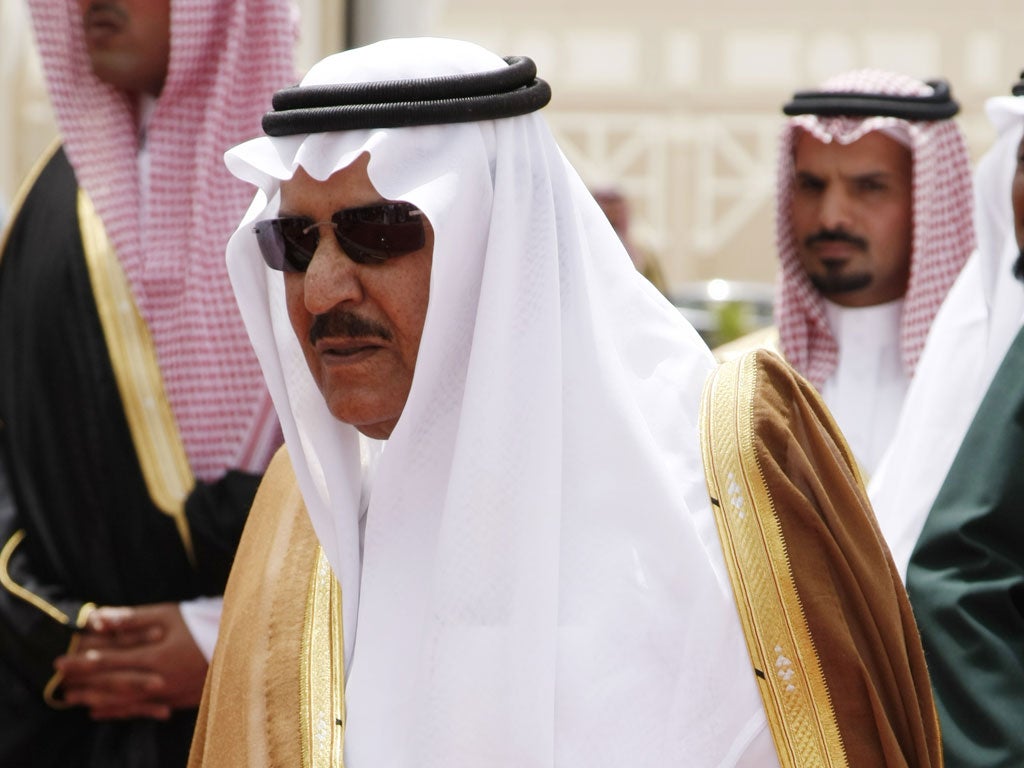New successor sought as hard-line Saudi Crown Prince dies

Your support helps us to tell the story
From reproductive rights to climate change to Big Tech, The Independent is on the ground when the story is developing. Whether it's investigating the financials of Elon Musk's pro-Trump PAC or producing our latest documentary, 'The A Word', which shines a light on the American women fighting for reproductive rights, we know how important it is to parse out the facts from the messaging.
At such a critical moment in US history, we need reporters on the ground. Your donation allows us to keep sending journalists to speak to both sides of the story.
The Independent is trusted by Americans across the entire political spectrum. And unlike many other quality news outlets, we choose not to lock Americans out of our reporting and analysis with paywalls. We believe quality journalism should be available to everyone, paid for by those who can afford it.
Your support makes all the difference.Crown Prince Nayef bin Abdul-Aziz al-Saud, the hard-line interior minister who led the crackdown on al-Qa'ida in Saudi Arabia after the 9/11 attacks before rising to become next in line to the throne, died in Geneva yesterday. He was in his late seventies.
His death means the country's royal family needs to appoint a new successor to King Abdullah, who is 88 and said to be in frail health. Prince Nayef became heir to the throne only last October, following the death of his brother, Sultan bin Abdul-Aziz. With a reputation as a tough conservative, it was feared among liberals that, had he taken over at the head of the royal court, he would have slowed down or abandoned King Abdullah's cautious democratic reforms.
Prince Nayef had previously suggested he saw no need for elections in the kingdom, or for women to sit on the Shura Council, an unelected advisory body to the King and the closest thing Saudi Arabia has to a parliament. His top concern was security and maintaining a fierce bulwark against Iran, according to US embassy assessments leaked to WikiLeaks.
The most likely candidate to replace him is seen as Prince Salman, 76, the Defence Minister. The decision ultimately rests with the Allegiance Council, an assembly of the descendants of Saudi Arabia's founder, King Abdul-Aziz.
Robert Jordan, US ambassador to Riyadh between 2001 and 2003, said Prince Salman "had a good handle on the delicate balancing act necessary to move society forward while being respectful of its traditions and conservative ways."
Prince Nayef was closer than many of his brothers to the Wahhabi religious establishment which gives legitimacy to the Saudi royal family, and worked to give a freer hand to the religious police who enforce strict social rules. At a conference of clerics last year, soon after becoming Crown Prince, he vowed that Saudi Arabia would "never sway from and never compromise on" its adherence to the puritanical, ultraconservative Wahhabi doctrine. The ideology, he said, "is the source of the kingdom's pride, success and progress".
Prince Nayef had expressed reservations about some of the reforms introduced by King Abdullah, who made incremental steps to introduce democracy and increase women's rights. Some analysts suggested he may have blocked some reforms.
In charge of internal security forces since 1975, Prince Nayef built up his power base though his crackdown on al-Qa'ida's membership in Saudi Arabia. He was also behind a broader campaign to prevent the growth of Islamic militancy among Saudis. By 2008, it was believed that al-Qa'ida's presence in the country had been nullified. But he also gained a formidable reputation among opponents amid accusations that political activists had been locked away without charge.
A soft-spoken, stocky man, Prince Nayef was born in 1933, the 23rd son of Abdul-Aziz, who founded the kingdom in 1932. He was one of the five surviving members of the Sudairi seven, sons of Abdul-Aziz with his wife Hussa bint Ahmad al-Sudairi. They all held influential positions.
Before being appointed interior minister, he held the posts of Riyadh governor, deputy minister of the interior and minister of state for internal affairs. He had 10 children from several wives. State television was yesterday playing Koranic verses and showing footage of pilgrims at the great mosque in Mecca where Prince Nayef is due to be buried today.
In a statement, David Cameron expressed the British government's condolences over the prince's death, praising his "leadership and dedication".
Join our commenting forum
Join thought-provoking conversations, follow other Independent readers and see their replies
Comments